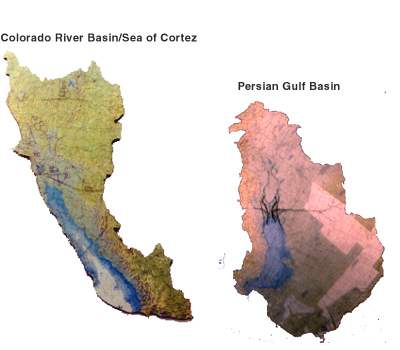As a part of his re-imaging the geopolitical stage, artist Peter Fend realizes the value of water basins pairing up with similar water basins around the globe.
His work also suggests the arbitraryness of many of the world's present boarders. He points out that the fact that the way in which Iraq/Saudi Arabia/Iran / Kuwait meet to form a "tri-state area" in a way similar to the NY/ NJ/Connecticut/Pennsylvania is no coincidence. He states that the maps- one drawn in the rennisance, one in the modern era- were drawn following the same template.
He suggests "Imaginetoo, the repercussions if our US governmet links efforts at hydrological and energy self-reliance in the inward draining great Basin with similar site efforts in all the territory which, with a few engineering asjustments, would drain into the Dead Sea.
As a part of a diplomatid offensive, the US could singel out ery small saltwater basins as test sites for its four of five renewable energy technologies, all water vased. A small rrelatively clean saltwater vasin in Nevada/California is singled out as a first testin area. Two Corallary sites, both Muslim, could bein the Lake Van Basin of Turkey and the Lake Rezyah (urmia) basin of Iran.
these areas are also Kurdish. The US would be fostering a self reliance for the regiousnwithout taking sides on (whatever might be) independent, after all, the Great Basin, although preponderantly Mormon, is not independent.
Energy Policy arise form gestures like those of Lawrence Weiner, with "an object tossed from one continent ot another." Or from performances like tose of Keith Sonnier, working on a "send.recieve" relation with other places.
The policy also builds on a practice at the US Dep. of State now, matching up river basins for coparative development. Under the State Dep., scientists and engineers are encouraged to match up and compare projects for the Yangtze basin on the one hand and the Mississippi/Missouri basin on the other , or fro the Yellow River basin on one hand, and the Rio Graned basin on the other.
We just continue this practice, extending it to all the basins of the United States available for comparative development with other like basins. To ve inclusive of all land, we deal with not just river basins but with ocean basins. For the Yangtze/Yellow rivers, there's the Yellow Sea/East China sea and for the Missippi/Misouri and Rio Grande rivers, there;s the Gulf of Mexico, with attendant outflow into the GulfStream.
But we depart form a mere comparison effort to a send-receive one. In line with what oceanograpehers know, we correlate basins with basins accordingly as the send and receive:- the Gulf of m,exico/Gulfsteam currents send to Europe and recieves the Iberian Current from Europe."....
"energy and ecology practices in one basin can be attempted in others, the regions are sufficiently similar, with problems, terrains, hydrology and possibilities that can be commonly addressed. Imagine the repercussions if our US government, instead of threatening Saddam Hussein, promotes instead a pan-Gulf ecology hydrology development sceme, always using renewable energy technologies, based on practices being tested collaboratively withMexico in the Gulf of California.
Peter Fend can be reached at fend@ocean-earth.com
